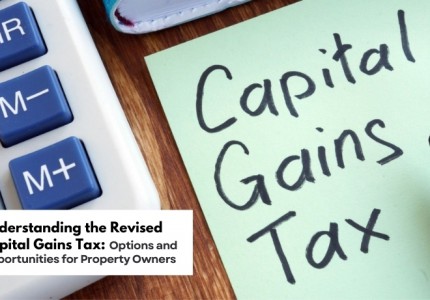Understanding the Revised Capital Gains Tax: Options and Opportunities for Property Owners
.jpg)
The recent modifications to the long-term capital gains (LTCG) tax regime announced in the 2024 Union Budget have stirred significant discussion among taxpayers, industry stakeholders, and political representatives. Finance Minister Nirmala Sitharaman's announcement to reduce the LTCG tax rate from 20% with indexation benefits to 12.5% without indexation has faced backlash, particularly from opposition parties and members of the NDA coalition. In response to this criticism, the government has made amendments to provide some relief for real estate transactions.
Key Changes to the Capital Gains Tax Regime
Under the revised framework, taxpayers will now have the option to choose between two tax rates for transactions involving immovable properties, such as land and buildings, acquired before July 23, 2024. This decision marks a significant shift from the government's previous stance, which had been met with sharp critiques regarding the potential negative impact on middle-class homeowners and the broader real estate sector.
The Two Tax Rate Options
1. Option 1: Pay a 20% tax on capital gains after adjusting the purchase price for inflation (indexation).
2. Option 2: Pay a 12.5% tax without any indexation adjustment.
This amendment allows taxpayers to select the option that minimizes their tax liability, particularly for properties acquired before the specified date. The introduction of these options aims to alleviate concerns about the loss of indexation benefits, which many argued would disproportionately affect long-term property owners who had not seen significant appreciation in their investments.
Retrospective Tax Changes and Industry Reactions
The removal of indexation benefits was perceived as a retrospective tax change, impacting individuals who had already invested in real estate. Industry associations and several Members of Parliament (MPs) voiced their concerns, emphasizing that the elimination of indexation would particularly harm those who had invested in properties with lower appreciation over time.TDP MP Lavu Sri Krishna Devarayalu highlighted the issue during a Lok Sabha debate, stating that the middle class relies on real estate as a safe investment. He urged the Finance Minister to reconsider the indexation removal, reflecting a broader sentiment among lawmakers advocating for the protection of middle-class taxpayers.
Understanding the Capital Gains Tax Rates
The long-term capital gains tax rate was initially lowered to 12.5% in the Union Budget 2024, but the elimination of indexation benefits raised concerns about a higher tax burden for many property owners. The new tax structure could potentially benefit those who have made substantial gains in a short period, while long-term property owners might face increased tax liabilities.
Tax Rate Breakdown
- Without Indexation: If you sell a property for a significant gain, the 12.5% tax rate may seem attractive initially. However, for properties held over a longer period, where inflation has significantly increased the property's value, the 20% tax rate with indexation could be more beneficial.
- With Indexation: The indexation benefit adjusts the purchase price based on inflation, potentially lowering the taxable capital gains and overall tax liability.
Example Scenarios
To illustrate the impact of these tax options, consider the following scenarios:
Case 1: A property purchased on January 1, 2002, for ₹1 crore is sold on August 1, 2024, for ₹5 crores.
- Option A: Tax at 20% on indexed gains. If the indexed cost is ₹3.63 crores, the gains are ₹1.37 crores, resulting in a tax of ₹27.4 lakhs.
- Option B: Tax at 12.5% on the full ₹4 crore profit, resulting in a tax of ₹50 lakhs.
In this case, the taxpayer would opt for the lower tax liability of ₹27.4 lakhs.
Case 2: A property bought on January 1, 2015, for ₹1.8 crores is sold for ₹5 crores.
- Option A: Tax at 20% on indexed gains, leading to a tax of ₹45.55 lakhs.
- Option B: Tax at 12.5% on the ₹3.2 crore profit, resulting in a tax of ₹40 lakhs.
Here, the taxpayer would again choose the lower tax liability of ₹40 lakhs.
Important Considerations for Taxpayers
While the recent amendments provide some relief, there are critical points to keep in mind:
- Limited to Real Estate Transactions: The changes specifically affect capital gains from the sale of real estate.
- No Choice for Losses: Taxpayers cannot choose between the old and new regimes if the previous regime results in a loss. Losses incurred under the old regime cannot be recognized under the new one.
- Government's Balancing Act: The government's actions reflect an attempt to balance the need for tax revenue with taxpayer concerns about the removal of indexation benefits.
Flexibility for Property Sellers
The government's decision to allow taxpayers to choose between a 12.5% tax rate without indexation and a 20% rate with indexation for properties acquired before July 23, 2024, provides sellers with valuable flexibility. This change enables property owners to select the option that best aligns with their financial situation and the appreciation of their property.
While the 12.5% rate may appear attractive, it is essential for taxpayers to carefully evaluate their unique circumstances before making a decision. In cases where property appreciation aligns closely with inflation, the indexation benefit may still prove advantageous.
As the real estate landscape evolves, these modifications to the capital gains tax regime are expected to influence market dynamics, potentially stimulating investment and activity in the sector. For homeowners and investors alike, staying informed about these changes is crucial for making sound financial decisions in the current market environment.
If you’re considering buying or selling property in light of these changes, consult with a financial advisor to understand how these tax implications may affect your investment strategy.
